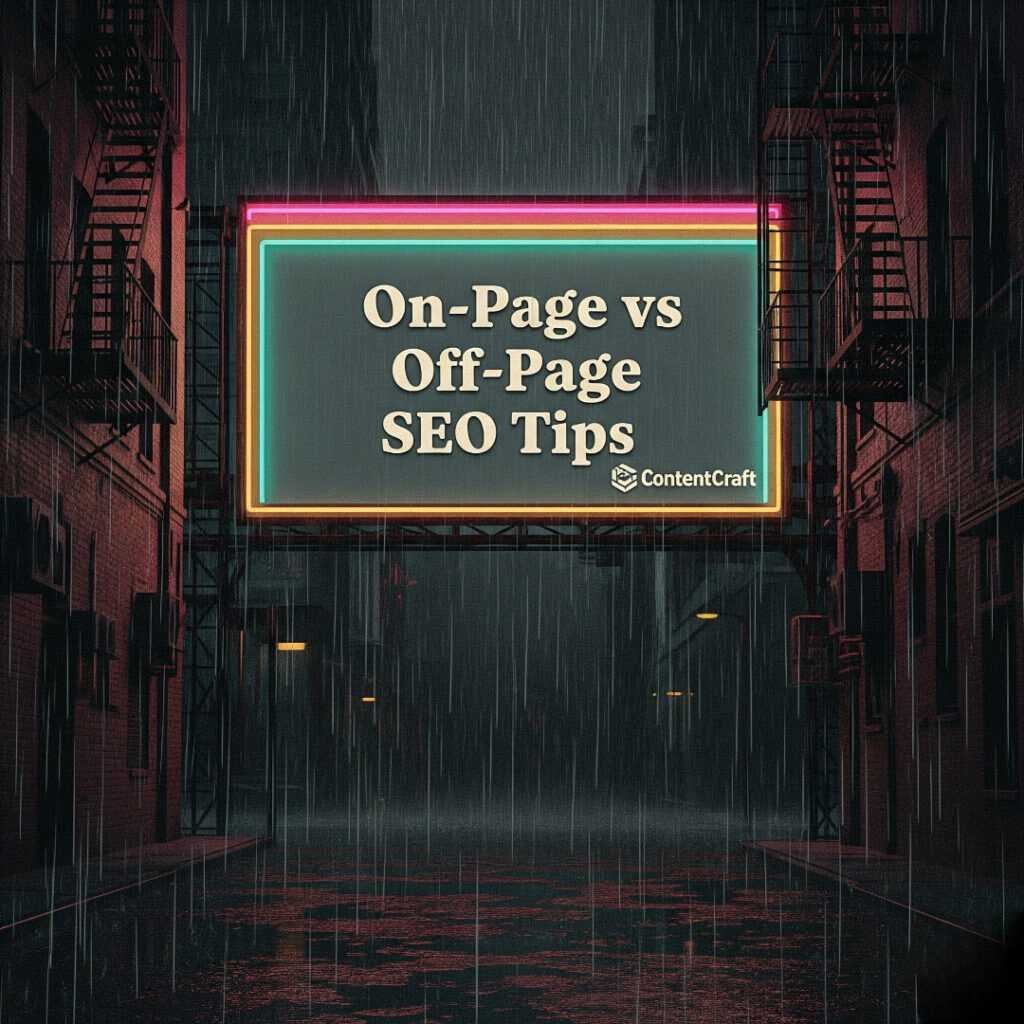Okay, so on-page vs off-page SEO is like choosing between cleaning your apartment or convincing strangers to tell everyone it’s the coolest spot in Chicago. I’m sitting here in my tiny place, the radiator clanking like it’s mocking me, trying to crack what actually gets people to visit a website. I swear, I’ve spilled coffee on my laptop three times this month—once when I broke a meta tag and panicked, another when I realized a backlink I chased was from some sketchy blog about “discount socks.” SEO’s a hot mess, but it’s my hot mess, and I’ve got stories. Let’s dive in, cool? My thoughts are all over the place, like the sticky notes falling off my monitor.
Why On-Page vs Off-Page SEO Makes Me Wanna Scream
I used to think on-page SEO was just throwing keywords into my blog posts like I’m tossing glitter at a party. Meta tags, H1s, alt text—piece of cake, right? Ha, nope. Last week, I spent, like, four hours obsessing over one title tag for my weird side hustle blog (it’s about artisanal pickles, don’t judge). I was all, “This is it, Google’s gonna love me!” Spoiler: my traffic barely twitched. On-page optimization’s like building a dope foundation for a house—super important, but nobody’s showing up unless you put up signs. That’s where off-page SEO, like backlinks and social media hype, swoops in.
- On-Page SEO: All the stuff you can control on your site. Title tags, content, internal links, and making sure your site doesn’t load like it’s stuck in the dial-up era.
- Off-Page SEO: The outside world hyping you up—backlinks, social shares, guest posts. It’s like getting your loud friend to yell about how awesome you are at a bar.

My On-Page SEO Screw-Ups and Tiny Wins
On-page optimization’s my jam ‘cause I can control it. I’m in my sweatpants, the faint smell of burnt bagel from my breakfast disaster still hanging around, tweaking meta descriptions like I’m solving world hunger. A couple weeks ago, I rewrote every title tag on my pickle blog to sneak in “on-page vs off-page SEO” vibes, like “best pickle recipes for SEO geeks.” Did it work? Sorta. My click-through rate bumped up, like, 1.5%, which felt huge until I saw I was still getting maybe 10 visitors a day. Brutal.
Here’s what I’ve figured out about on-page stuff:
- Keywords are tricky: Jamming “on-page vs off-page SEO” into every line makes you sound like a spammy bot. I tried it, and my sister was like, “Your blog sounds like a used car ad.” Oof. Use keywords like you’re chatting, not preaching.
- Site speed’s a big deal: My site used to load slower than my neighbor’s ancient Buick. I ran it through Google’s PageSpeed Insights, and turns out, my massive header image was killing it. Compressed that sucker, and traffic jumped maybe 8%.
- Alt text’s legit: I started adding alt text to images, like “pickle jar next to my chaotic SEO notes.” Google digs it, and it’s good for accessibility.
But real talk? On-page tweaks only get you so far. I got cocky, thinking my perfectly optimized site would shoot to Google’s front page. Nope. Google was like, “Nice try, but who’s got your back?” That’s when off-page SEO slapped me awake.
Off-Page SEO: My Cringe Networking Moments
Off-page SEO’s like trying to make friends in a new city when you’re super awkward. I’m that dude in a Reddit thread, nervously pitching my blog like it’s a high school talent show. Last month, I emailed a bunch of bloggers for backlinks and got ghosted by, like, 90% of them. One guy straight-up said, “Your pickle blog’s… interesting, but pass.” Ouch, my ego. Still, I scored a guest post on a food blog (inspired by Serious Eats), and that one backlink made my traffic spike like crazy for a few days.
Here’s my off-page SEO cheat sheet:
- Backlinks are everything: Not all links are equal. A random forum link’s like a coupon for expired yogurt—worthless. Quality sites in your niche are gold. I got a link from a Chicago food blog, and it was like SEO Red Bull.
- Social media’s wild: I tweeted my pickle blog, and some random dude with 8k followers retweeted it. Traffic went nuts for, like, three days. Lesson? Post your stuff, even if it feels like screaming into the void.
- Don’t be desperate: I DM’d influencers for shoutouts and got blocked by one. Yeah, I’m that guy. Build real connections first—don’t be me.

Juggling On-Page vs Off-Page SEO: My Total Chaos
Here’s the raw truth: I’m terrible at balance. I’ll geek out on on-page optimization, tweaking meta tags until my eyes burn, then totally ghost off-page stuff for weeks. My apartment’s the same—half-organized desk, half-exploded laundry pile. Last week, I saw my traffic flatline in Google Analytics and freaked out. I begged a friend to share my blog on LinkedIn, and it worked, but it felt like cheating. On-page vs off-page SEO is like peanut butter and jelly—you need both, or it’s just a sad sandwich.
Tips So You Don’t Crash Like Me
- Start on-page: Get your site tight first. Tools like Yoast SEO help with keyword density and readability. I skipped this once and tanked my rankings.
- Go slow with backlinks: Don’t spam like I did. Pitch one or two solid sites with something they’d want. I sent a pickle recipe to a food blog, and they linked back.
- Track your wins: I use Google Analytics to see what’s popping. That food blog backlink? 150 clicks. My keyword-stuffed post? Like, five.

Wrapping Up My SEO Rant
So, on-page vs off-page SEO? It’s not one or the other—you gotta do both, and I’m still tripping over my own feet trying to figure it out. I’m in my Chicago apartment, the wind howling outside, wondering if my next backlink will make my pickle blog blow up. Doubt it, but I’m kinda hopeful anyway. If you’re wading into this SEO swamp, start with your site, then hustle for those backlinks. And don’t spill coffee on your keyboard like me, okay? Got any SEO disasters or wins to share? Hit the comments—I need the inspo.




